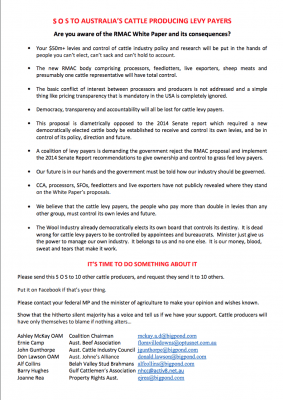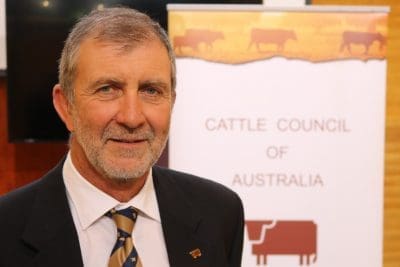A group of cattle producers has stepped up a campaign against the proposed model for red industry reform recommended by the Red Meat Advisory Council’s red meat Memorandum of Understanding review taskforce in early July.
In a brief but strongly worded document which has been circulated throughout industry this week, a group of seven cattle producers and levy payer representatives has issued an SOS urging cattle transaction levy payers to demand that the Federal Government reject the RMAC proposal and implement the 2014 Senate Report recommendations to give ownership and control to grass fed levy payers.

A screenshot of the document.
The coalition of levy payers behind the push are group chair and Queensland cattle producer Ashley McKay OAM, Australian Beef Assocition representative Ernie Camp; Australian Cattle Industry Council representative John Gunthorpe; Australian Johne’s Alliance representative Don Lawson OAM, Belah Valley Brahman Stud principal Alf Collins, Gulf Cattlemen’s Association representative Barry Hughes and Property Rights Australia representative Joanne Rea.
Click here to read full document
Despite almost three months passing since the committee’s restructure model was publicly unveiled by chair Jim Varghese, most of the peak industry councils representing the various red meat sectors have yet to publicly reveal whether they support the concept of a single new super red meat body controlling all red meat levies to be called “Red Meat Australia”.
In comments to Beef Central today Cattle Council of Australia president Tony Hegarty said there are clear producer concerns about elements of the White Paper proposals, especially the role cattle producers would have in terms of governance given grass-fed producers contribute the most red meat industry levies (see more below).
The “SOS to Australia’s cattle producing levy payers” tells producers their “$50m+ levies and control of cattle industry policy and research will be put in the hands of people you can’t elect, can’t sack and can’t hold to account”.
Other stated concerns listed in the document include:
- The new RMAC body comprising processors, feedlotters, live exporters, sheep meats and presumably one cattle representative will have total control.
- The basic conflict of interest between processors and producers is not addressed and a simple thing like pricing transparency that is mandatory in the USA is completely ignored.
- Democracy, transparency and accountability will all be lost for cattle levy payers.
- This proposal is diametrically opposed to the 2014 Senate report which required a new democratically elected cattle body be established to receive and control its own levies, and be in control of its policy, direction and future.
“Minister just give us the power to manage our own industry. It belongs to us and no one else. It is our money, blood, sweat and tears that make it work. It’s time to do something about it,” the document implores, urging producers to take to social media or contact their Federal MP or the Minister of Agriculture to make their opinion known.
In response to the letter, CCA president Tony Hegarty said he welcomed producers taking the opportunity to speak-up on the critical reforms proposed in the White Paper.
“The key consideration for Cattle Council, our founding State Farming Organisation members and our direct members, is always achieving the most effective representation for cattle producers and the best possible oversight of levies spent on their behalf,” Mr Hegarty said.
“These objectives have framed Cattle Council’s consideration of the structural reforms proposed in the Red Meat MoU White Paper, and have been reflected in the feedback from SFOs.
“Based on these objectives, the consensus demonstrates there are clear producer concerns about elements of the White Paper proposals, especially the role cattle producers would have in terms of governance given grass-fed producers contribute the most red meat industry levies.
“Our extensive consultation with members demonstrates producers are unwilling to cede any share of industry representation, nor any say in how industry levies are spent. Specifically, there is no compelling evidence nor specific detail which outlines how the proposed Red Meat Australia would realise better representative outcomes for beef cattle producers.
“Cattle Council and our members are open-minded regarding about other reforms proposed in the White Paper. While the scope for efficiencies which could be achieved under a single red meat research body are attractive, any such consolidation would need to embrace strong producer representation and accountable levy investment.
“There is scope for better governance and accountability of service providers, but the case is yet to be made in terms of how any restructures or mergers would achieve better outcomes for producers and other levy payers”.
He said an example of better processes and representation in the industry was Cattle Council’s progress in moving to a direct-election model, which, if the structures proposed in the White Paper were adopted, could be superseded at the expense of more accountable and democratic producer representation.
“To offset these concerns, greater clarity is needed to outline how producers would be able to provide direct input into the decisions that affect them.
“NewCo 3 has strong producer support, although a significant question remains regarding how any MoU-driven restructure would relate to Animal Health Australia, especially given the importance of biosecurity to our industry.
“That AHA is not included in any proposed structural changes needs revisiting. Furthermore, in any restructure of industry standards bodies, the integrity of AusMeat’s independent auditing functions must be maintained.”

